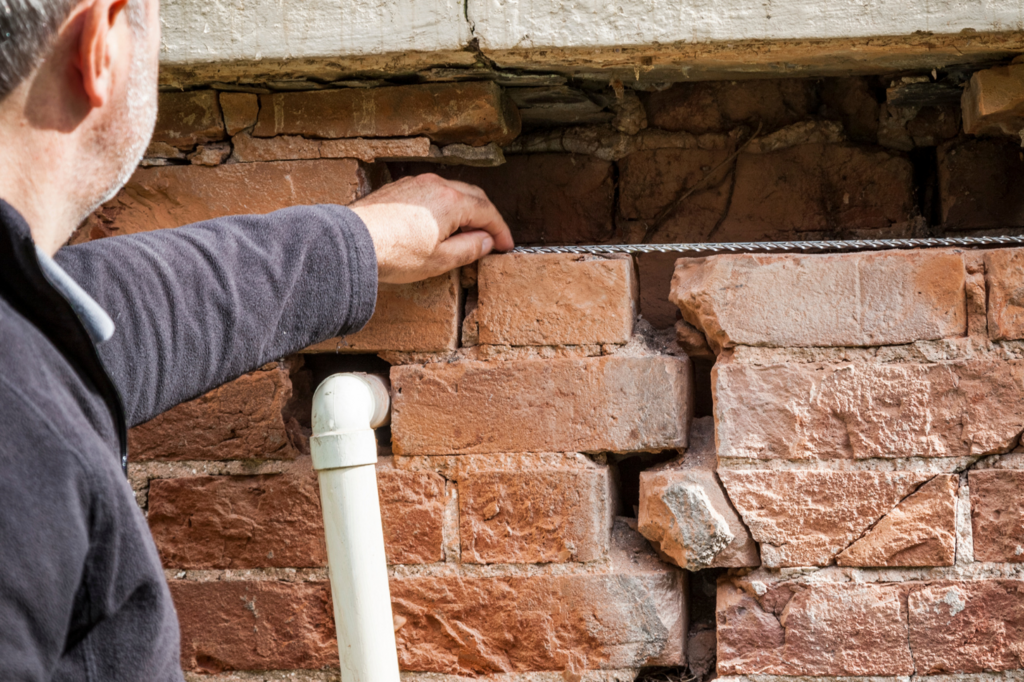Seeing a crack on your basement wall is a worry for every homeowner. It makes you question the safety of your home. But, fixing it is easier than you think.
Early detection and the right repair method are key. Whether it’s a small crack or a big one, acting fast is important. With the right tools and knowledge, DIY repair can work. For bigger problems, a pro might be needed.
Types of Basement Wall Cracks
It’s important to know about different basement wall cracks to keep your home safe. Basement walls can have various cracks, each showing a different problem. Let’s look at the most common types you might see.
Vertical Cracks
Vertical cracks in basement walls are usually not too serious. They happen when concrete shrinks as it dries. Even though they’re not as bad, they can let water in. Fixing these cracks quickly keeps your basement dry.
Horizontal Cracks
Horizontal cracks are a bigger worry. They show that the wall is under a lot of stress from water pressure. These cracks can weaken your basement and need quick help from experts. Fixing the walls and improving drainage can stop more damage.
Diagonal or Stair-Step Cracks
Diagonal or stair-step cracks often show up in block basement walls. They’re caused by uneven settling or soil pressure. These cracks can mean serious foundation issues. Finding and fixing these cracks early can save you from bigger problems later.
Common Causes of Basement Wall Cracks
It’s important to know why basement walls crack. Common reasons include water pressure, poor drainage, foundation settlement, and aging. Each of these can put stress on the foundation in different ways.
Water Pressure and Poor Drainage
Hydrostatic pressure is a big cause of basement wall cracks. When water builds up around the foundation, it pushes hard on the walls. This can cause damage and lead to cracks.
Foundation Settlement and Soil Expansion
Foundation settlement happens when the soil under the foundation changes. This can make the foundation uneven. When the soil expands in wet conditions, it can push the foundation, causing cracks.
Structural Stress or Poor Construction
Poor construction and bad materials can also cause cracks. Over time, these issues can weaken the foundation. This often shows up as big structural cracks.
Aging Materials and Natural Wear
As buildings get older, materials can start to crack. Older materials are more likely to break down from soil pressure and other environmental factors. Keeping up with maintenance and fixing problems quickly can help prevent this.
Signs You Should Worry About
Visible cracks in your basement walls are more than just an eyesore; they can indicate deeper structural risk. Being aware of warning signs early can prevent more severe damage. One significant symptom to watch out for is doors or windows that suddenly jam or fail to close properly.
This often signals that the foundation is shifting or settling, which demands prompt attention during a basement inspection. Also, gaps appearing between wall seams or between the floors and walls are red flags. Visible signs like bowing or bulging walls directly indicate increased structural risk. Water seepage during rainfall should also not be ignored, as it suggests compromised structural integrity.
When to Call a Professional

Some small basement wall cracks can be fixed on your own. But, there are times when you need a pro. If you see big cracks, like ones that can fit a coin, it’s time to call a masonry contractor or a structural engineer. In colder parts of Canada, such as Calgary, temperature changes can cause cracks or shifting in walls. If you see this happening, it’s time to call a professional specializing in masonry in Calgary or a structural engineer.
Choosing the Best Masonry Repair for You
Selecting the right masonry repair method depends on the crack type and wall condition. Each approach serves a different purpose to restore stability and keep your structure strong over time.
Epoxy or Polyurethane Injection
Epoxy injection is great for sealing cracks and making walls strong again. It fills the crack with a resin that bonds the wall invisibly. This is perfect for small cracks and leaks.
Polyurethane injection is more flexible and works well for active leaks. It expands to fill gaps and moves with the wall.
Hydraulic Cement Patch
For big, visible gaps, a hydraulic cement patch is very useful. It expands as it sets, creating a waterproof barrier. This method is great for quick and strong fixes.
Reinforcing with Carbon Fiber Straps
Carbon fiber straps are strong for walls that are bowing. They add strength and prevent the wall from moving more. Their high tensile strength makes them ideal for fixing weak basement walls.
Repointing and Surface Sealing
Repointing refreshes mortar joints between bricks or stones. It’s key for keeping the wall strong. Adding surface sealing helps protect against moisture. Together, they keep the masonry healthy.
Preventing Future Basement Cracks
Prevention is key to keeping your basement walls strong. By taking certain steps, you can protect your home’s foundation from cracks. This ensures your home lasts longer. Here are important ways to stop basement cracks from happening again.
Keep Water Away from the Foundation
Managing water well is key to stop hydrostatic pressure on your foundation walls. Make sure your downspouts and gutters work right and send water away from your house. Also, installing good drainage systems helps keep water from your foundation.
Maintain Proper Grading and Drainage
It’s important to keep the ground around your home sloped right for foundation maintenance. The ground should slope away from your foundation to stop water from gathering near your walls. Check and adjust the soil grading often. Also, make sure all drainage systems work well to avoid soil problems that can cause cracks.
Regular Inspections and Timely Repairs
Regular checks help spot small cracks early, before they get big. Doing proactive repairs means fixing small problems fast to avoid bigger damage. Watch for signs of trouble and fix them quickly to prevent bigger problems.
In Conclusion
Dealing with basement wall cracks is key for keeping your basement healthy and your home safe. Knowing the type of crack helps you figure out why it happened and how to fix it. Things like water pressure, foundation settling, and old materials often cause these problems.
Whether you choose to fix it yourself or get a professional, understanding your options is important. You can use epoxy injections or carbon fiber to strengthen your walls. Taking steps like proper drainage and regular checks can also help prevent cracks.

